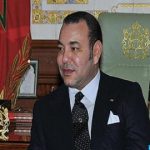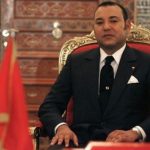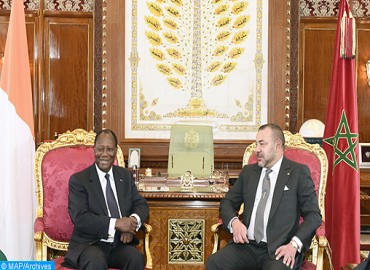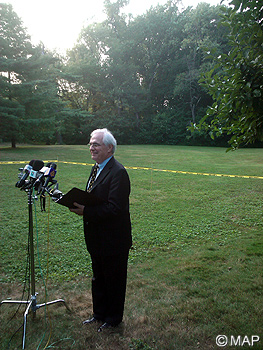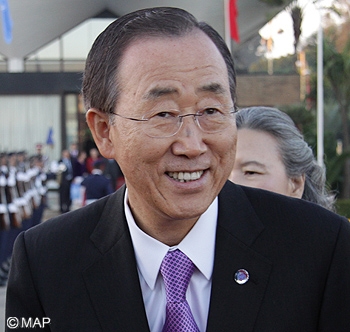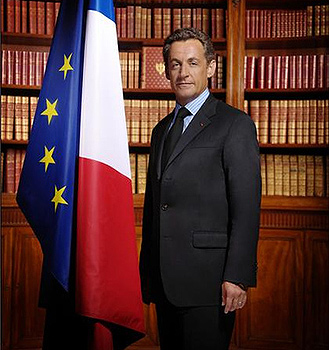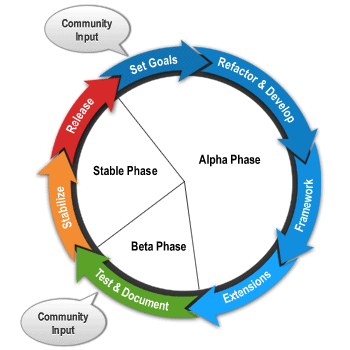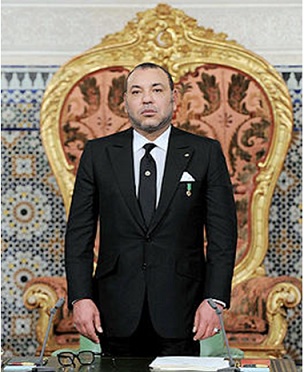Full Text of HM the King at Opening of ‘Africa Action Summit’
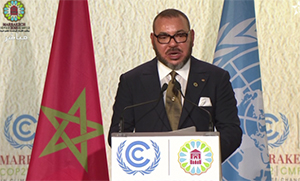
PERSISMA, Marrakesh – HM King Mohammed VI gave, on Wednesday, a speech at the opening of the “Africa Action Summit”, held in Marrakesh on the sidelines of the 22nd Conference of Parties to the UN Framework Convention on Climate Change (COP22).
Here follows the full text of the speech:
Distinguished Heads of State and Government of African sister nations, Your Excellency Mr. Idriss Deby Itno, current Chairman of the African Union,
Your Excellencies,
Ladies and Gentlemen,
The Kingdom of Morocco, and the city of Marrakesh in particular, are delighted to welcome you to the “Africa Action Summit”, which is being held on the sidelines of the COP22.
We are honored to have you here with us today. Your presence is a testament to your commitment to an African continent that is looking to the future and shaping its own destiny.
I have taken the initiative to invite you to this Summit so that our Continent may agree on a common approach to fighting climate change as well as on actionable measures for sustainable development.
Bringing large-scale regional and transnational projects to fruition is the challenge I am inviting you to take up.
I suggest that we build an African continent that is resilient to climate change and that commits resolutely to sustainable development; an African continent that will use its resources in an optimal way, while respecting environmental and social balances; a continent that will seek to promote inclusive development, in line with the specific features of its identity, particularly the culture of sharing, of fairness and of solidarity.
Before going any further, I would like to raise a fundamental question. It goes without saying that the concern about the future of our planet and the interest taken in the issue by active civil society organizations are real.
But are there really any common, action-oriented objectives? There are two basic elements I would like to consider with you in this regard.
First, there is a disparity between the North and the South when it comes to culture and the environment. That disparity concerns priorities as well as means.
For this reason, it is important to harmonize, even unify, environmental education efforts. The Moroccan Presidency will seek to achieve that objective during its term.
Do we need to point out that the colonial era is over, and that imposed decisions cannot be productive? Do we need to point out that stakeholders lack neither the commitment nor the goodwill required, though they sometimes lack the necessary means?
We are all aware that what is at stake is the preservation of life, and that we need to work together to protect the Earth. It is precisely for this reason that I would like to see a convergence of views regarding our actions on the ground.
Your Excellencies,
Ladies and Gentlemen,
Africa is paying a heavy price in the climate equation. It is, undoubtedly, the continent that is suffering the most.
Rising temperatures, shifting seasons and successive droughts are depleting the biodiversity of our continent, destroying ecosystems and jeopardizing Africa’s progress, security and stability.
And yet, our continent is responsible for only 4% of greenhouse gas emissions.
However, climate change on a global scale is significantly hampering Africa’s development and poses a serious threat to the basic rights of tens of millions of Africans.
As a result, all types of vulnerabilities are concentrated in our continent.
There are already 10 million climate refugees in Africa. By 2020, nearly 60 million people will be displaced because of water scarcity if no measures are taken in this regard.
The immense freshwater reservoir that Lake Chad used to be has already lost 94% of its surface area and is facing the risk of drying up once and for all. 4 million hectares of forest – that is to say, twice the global average – are lost each year.
African agriculture – which consists predominantly of subsistence farming – employs 60% of the African workforce; yet our crops suffer from severe disruptions, and our food security is seriously jeopardized.
Agricultural output in Africa could therefore drop by 20% by the year 2050, at a time when our population will have doubled.
Entire sections of the coastline and almost a third of coastal infrastructure would be submerged.
Water-borne diseases, which kill thousands of people each year, would be eradicated if wastewater treatment plants were created.
Finally, the degradation of land and of natural resources could continue to be the main driver of most transnational conflicts in Africa.
Your Excellencies,
Ladies and Gentlemen,
The Paris Climate Agreement, which was adopted to the satisfaction of all, enshrines the principle of common but differentiated responsibilities.
It is important that our continent speak with one voice, demand climate justice as well as the mobilization of the necessary resources and submit concerted proposals in connection with the fight against climate change.
There are four things that need to be done:
• identify measures to gain access to funding in order to organize the continent’s adaptation efforts;
• identify the mechanisms needed to support the implementation of flagship programs;
• ensure institutional capacity building in our continent;
• and finally, seize opportunities and study the implications of low-carbon development in the fields of energy, technological innovation and “green” jobs.
Your Excellencies,
Ladies and Gentlemen,
African stakeholders showed remarkable dynamism during the thematic days of COP22.
In addition to being project promoters, they have joined many Coalitions, Alliances and Networks of the Global Climate Action Agenda.
It is gratifying to see these continental and regional actions. Not only do they increase our continent’s resilience in the face of climate change threats, but they also allow for the common, sustainable emergence of our continent.
My brothers the Heads of State will have the opportunity today to tell us about the projects they are spearheading and championing.
We are duty-bound to lend political support to these initiatives, to mobilize the means and competences required for their implementation, to put them into perspective and to ensure their coherence.
Your Excellencies,
Ladies and Gentlemen,
The Kingdom of Morocco is a committed actor in the task of consolidating regional security and stability.
In this regard, it is determined to enhance its contribution to defending the vital interests of the continent, alongside sister nations and, soon, within the African Union.
As it implements its ambitious program in the field of renewable energy, Morocco is making its expertise available to its partners.
By being actively involved in projects centered on Africa, the Kingdom of Morocco is, today, contributing to bringing new partners on board, both public and private, as well as structuring governance mechanisms.
My country will also lead an African climate expertise network, through the Climate Change Competence Center based in Morocco.
Aware of the vulnerability of the agricultural sector and of its vital importance, Morocco is actively preparing for the implementation of the “Adaptation of African Agriculture” (Triple A) initiative.
This innovative system promotes the adoption and financing of solutions to increase productivity and ensure food security.
Finally, given the share allocated to Africa in terms of resources to combat climate change, Morocco has made financing a priority issue of the COP22.
In addition to the funding provided for in the Paris Agreement as of 2020, the Moroccan Presidency is keen to see public funding mobilized, financial arrangements diversified and access to climate funds facilitated.
Moreover, Morocco encourages the involvement of Sovereign Funds in order to develop green infrastructure in Africa.
Your Excellencies,
Ladies and Gentlemen,
Our partners in the South and the North, as well as the international and regional institutions operating in the field of development financing, have a crucial role to play in shoring up Africa’s collective effort.
Doing things ourselves and for ourselves is imperative. And involving our strategic partners has now become a necessity.
By pooling efforts and consolidating cooperation with our strategic partners, I am convinced we can redress the climate injustice affecting our continent.
This twofold action will contribute to the achievement of the Sustainable Development Goals, knowing that twelve of the seventeen SDGs are directly or indirectly linked to climate change.
To conclude, I should like to assure you that my country will undertake all necessary actions and spare no effort to make sure Africa’s voice is heard, both in the formal negotiations and in the implementation of the Global Climate Action Agenda.
I hope today’s meeting will not only be a decisive step and a worthwhile exercise, but will also reflect our commitment, before history, towards future generations.
Thank you for your kind attention.

